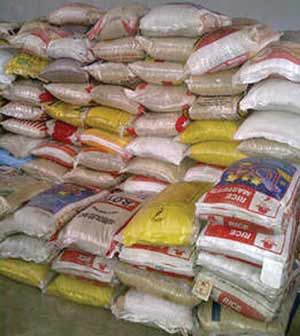
Vice-President Yemi Osinbajo has warned that three ship loads of 120,000 metric tons of Thailand rice are to be smuggled into Nigeria.
The ships are going to berth in one of the neighbouring countries, from where the rice would be smuggled into Nigeria, he said.
“It is very clear that the rice is meant for Nigeria because they don’t consume parboiled rice in that country; they consume the white broken rice.
“Our neighbours do excellent business with allowing rice to come into Nigeria.”
The vice-president recalled that a similar thing happened last Christmas when Nigeria blocked about 500,000 metric tons of rice coming into the country from one of its neighbours.
“Our neighbours do excellent business with allowing rice to come into Nigeria.”The smuggling of agricultural produce into Nigeria is an existential threat to the country’s agricultural sector, he said on Monday at the Sixth Presidential Business Forum held at the Banquet Hall of the Presidential Villa, Abuja.
He also identified the low customs duties being charged in some of the neighbouring countries as one of the factors that encouraged the smuggling of rice and other agricultural produce through them into Nigeria.
He said Nigeria would go to these countries “in as friendly and in a polite manner as possible to ensure that this practice stopped.”
On government’s intervention funds in agriculture, Osinbajo revealed that already President Buhari had directed that a committee is set up to explore the use of the funds to boost agricultural activities in the country.
In his remarks, Minister of Agriculture and Rural Development, Mr Audu Ogbeh, gave an overview on the progress made in agriculture, saying Nigeria’s import of rice has dropped by about 95 percent from 644, 131 metric tons in Sept. 2015 to 20,000 tons in Sept. 2017.He said: “I’m chairing a committee to look at how to not only use intervention funds but how to monitor the use of intervention funds.’’
According to him, the idea is to ensure that intervention funds go to the right persons.
Osinbajo said that government would not “bring down interest rate overnight,” pointing out that the “way out is by some kind of intervention and that’s what the president has asked that we do.”
He further disclosed that government was refining the Anchor Borrowers’ Programme and other intervention funds for agriculture with a view to making them more effective in assisting farmers.
The vice-president also spoke on the efforts being made to address the gridlock at the Apapa and Tincan ports in Lagos as well as land ownership, titling and clearing.
On electricity tariff, Osinbajo said Nigerians must brace up for the payment of higher electricity tariffs, insisting “it has become inevitable.On electricity tariff, Osinbajo said Nigerians must brace up for the payment of higher electricity tariffs, insisting “it has become inevitable.
“There is no question at all that we must pay higher tariffs.’’
He said, however, that government was not going to increase tariff for now but was working towards cleaning the electricity value chain.
He stated that the N700 billion Payment Assurance Guarantee set aside by government was payment to ensure uninterrupted payment for gas and liquidity in the power sector.
Osinbajo said the payment assurance guarantee was to fund a smooth transition “from where we are to a much more market-determined policy for electricity.”
He said that federal government was working with the World Bank on this.
In his remarks, Minister of Agriculture and Rural Development, Mr Audu Ogbeh, gave an overview on the progress made in agriculture, saying Nigeria’s import of rice has dropped by about 95 percent from 644, 131 metric tons in Sept. 2015 to 20,000 tons in Sept. 2017.
He said: “I’m chairing a committee to look at how to not only use intervention funds but how to monitor the use of intervention funds.’’According to him, there are 12.2million farmers growing rice in Nigeria, mainly in states like Kebbi, Jigawa, Kano, Ebonyi and Nasarawa.
“We should be almost certain to meet our needs in local rice production,’’ he added.
The Minister of Industry, Trade and Investment, Mr Okechukwu Enelamah, also gave an update on the Export Promotion Grant; and the Chief Executive Officer of the WACOT Rice Mill in Kebbi State, Rahul Savara also spoke.
Participants from the private sector at the meeting raised questions and made observations on such issues as access to credit, quality control, protection of local farmers, land, among others.
The Sixth Presidential Business Forum, which focused on agriculture and its value chains, had Ministers, officials of government agencies and stakeholders in the agriculture sector in attendance.
NTA
Comments
Post a Comment